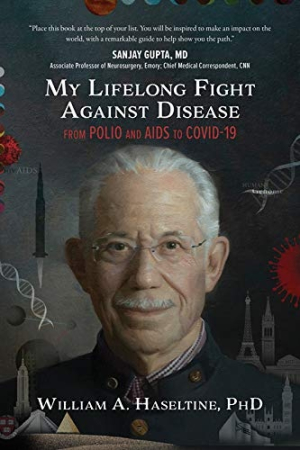My Lifelong Fight Against Disease
From Polio and AIDS to COVID-19
My Lifelong Fight Against Disease is a fascinating memoir from one of the greatest scientists of our time.
William A. Haseltine’s dazzling memoir My Lifelong Fight Against Disease covers his astounding contributions to medical science, all of which will continue to reverberate for years to come.
Haseltine’s interest in medicine began in early childhood: he was not quite four years old the first time he stood by his mother’s sickbed and wondered if she was going to die, and how he could help. That set of questions, further fueled by a series of trips across the world, led him to Berkeley University as a pre-med student. When medicine ended up not being the right fit, he switched to a PhD in biophysics. This, paired with his multidisciplinary approach to science, enabled him to become a key player in the fight against HIV/AIDS, a pioneer in genomic research, and an advocate in the quest for health care systems that are simultaneously more accessible and more efficient.
The events and influences that led Haseltine to become one of the most prestigious contemporary scientists are narrated in great detail. He credits strong governmental support of the sciences, and his parents’ interest in multiple fields of study, with his growing interest in multidisciplinary science. Indeed, a highlight of the book is Haseltine’s unique approach to his work: his interest in the connection between ideas, history, culture, and art not only gave him a broader perspective of the issues faced by the medical field, but also led him to pursue scientific achievement in service of humanity, not as its own goal. His reflections on such topics are among the most compelling parts of the book.
The book’s chapters about Haseltine’s time as an undergraduate at Berkeley and a graduate student at Harvard are also captivating. They tell a story of growth and increased critical thinking, showing Haseltine’s discipline when it came to his studies, as well as his move away from the conservative roots of his childhood in order to become an activist against the Vietnam War and an investigative war journalist. Later, Haseltine recalls his pioneering efforts during the HIV/AIDS pandemic, as the founder and CEO of Human Genome Sciences, and as the person to coin the term “regenerative medicine.” The accounts of such discoveries and breakthroughs are humbling. Haseltine is seen leading the charge in terms of investigation, education, and fundraising in new fields, suggesting that, were it not for him, today’s scientific landscape would likely look different.
The compelling, impassioned writing ensures that every discovery or study is explained, if sometimes in terms that are not quite accessible to laypeople. Still, the reasoning behind, and the impact of, every decision Haseltine made in his various labs comes through. His reflections on issues, and the arguments employed to back up his hypotheses, are engaging and persuasive.
Haseltine also covers the bonds, professional and personal, that he established with giants of the field. His list of mentors and friends reads like a who’s who of twentieth-century science, including Nobel Prize winners Jim Watson and Walter Gilbert and Dr. Anthony Fauci.
My Lifelong Fight Against Disease is a fascinating memoir from one of the greatest scientists of our time.
Reviewed by
Carolina Ciucci
Disclosure: This article is not an endorsement, but a review. The publisher of this book provided free copies of the book and paid a small fee to have their book reviewed by a professional reviewer. Foreword Reviews and Clarion Reviews make no guarantee that the publisher will receive a positive review. Foreword Magazine, Inc. is disclosing this in accordance with the Federal Trade Commission’s 16 CFR, Part 255.

